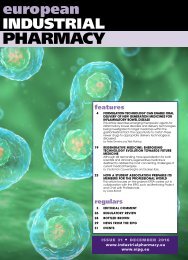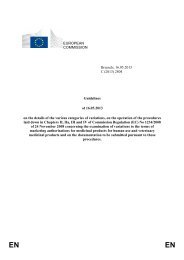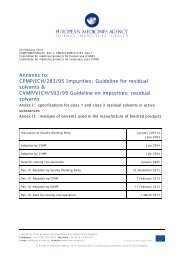PHARMACY
eip26-sep15
eip26-sep15
- No tags were found...
Create successful ePaper yourself
Turn your PDF publications into a flip-book with our unique Google optimized e-Paper software.
GETTING TO HIGHER<br />
QUALITY PROCESSES<br />
SOONER – NEW GUIDE<br />
HELPS YOU MAKE A<br />
BETTER CHOICE OF<br />
BIOLOGICAL MATERIALS<br />
by Patrick Ginty and Ben Sheridan<br />
The BSI (British Standards Institution), the UK's<br />
National standards body, has worked collaboratively<br />
with the Cell Therapy Catapult and a wider group of cell<br />
therapy experts, to develop PAS 157:2015 Evaluation of<br />
Materials of Biological Origin Used in the Production of<br />
Cell-Based Medicinal Products – Guide. This document<br />
supports the evaluation of biological materials used in<br />
the production of cell-based medicinal products for<br />
human use. It will help developers of high quality cellbased<br />
medicinal products to select the biological<br />
materials in a consistent manner. The aim is to reduce the<br />
probability of minimising both variation in product<br />
characteristics and the introduction of unwanted agents,<br />
thus potentially reducing the barriers to eventual<br />
successful commercialisation of the products. The<br />
background and key benefits of PAS 157:2015 are<br />
discussed, along with any previous guidance in this area<br />
as well as methods in which to mitigate risks associated<br />
with procurement of biological materials.<br />
Patrick Ginty is currently working as the Regulatory Affairs Manager at Cell Therapy<br />
Catapult Ltd in London. He gained his PhD in tissue engineering and drug delivery in<br />
2005 and has since spent 10 years working in both industry and academia pursuing a<br />
career in the regulation of cellular therapies and medical devices. During this time, he<br />
has received a certification from the Regulatory Affairs Professionals Society, has<br />
worked on over 20 different cell therapy products, and gained over 25<br />
publications/patents in regenerative medicine and cellular therapy.<br />
Ben Sheridan leads on the development of standards to underpin innovation in high<br />
value manufacturing at the BSI. He spent a number of years at the National Physical<br />
Laboratory, supporting the long-term development of measurement research<br />
programmes in support of emerging technologies, and before this worked in the<br />
semiconductor industry.<br />
Background<br />
Cell-based medicinal products are<br />
complex and their therapeutic<br />
benefits are often derived from<br />
mechanisms that are not fully<br />
understood, thus making it<br />
challenging to demonstrate the<br />
safety and efficacy of these<br />
medicinal products. As such, during<br />
the manufacture of these products,<br />
there is a strong requirement to<br />
minimise both sources of risk and<br />
process variability in order to<br />
maximise the quality of the final<br />
product. The choice of biological<br />
materials used in the production of<br />
cell-based medicinal products has a<br />
strong impact on important<br />
biological characteristics of the final<br />
product, such as viability, purity and<br />
potency, but can also have an<br />
adverse effect on product variability<br />
and also be potential sources of<br />
contamination.<br />
The BSI has worked with the Cell<br />
Therapy Catapult, as well as a wider<br />
range of cell therapy experts, to<br />
create a guide with the intention of<br />
helping those people looking to<br />
develop high quality cell-based<br />
medicinal products. The guide<br />
intends to help these developers<br />
select the biological materials in<br />
such a way that reduces the<br />
probability of minimising both<br />
variation in product characteristics<br />
and the introduction of unwanted<br />
agents, thus potentially reducing<br />
the barriers to eventual successful<br />
commercialisation of the products.<br />
This guide, with the title PAS<br />
157:2015 Evaluation of Materials of<br />
Biological Origin Used in the<br />
Production of Cell-Based Medicinal<br />
Products – Guide, is a document<br />
that supports the evaluation of<br />
biological materials used in the<br />
production of cell-based medicinal<br />
products for human use.<br />
What does the PAS cover?<br />
The PAS covers all biological<br />
materials that come into contact<br />
with the cellular active substance<br />
during the manufacturing process<br />
for cell-based medicinal products,<br />
such as those found in cell culture<br />
media components, e.g. cytokines,<br />
animal-derived sera, proteins, etc.<br />
The scope of the knowledge<br />
contained within the document<br />
includes guidance on the following.<br />
• Identifying, assessing and<br />
controlling risks associated with<br />
materials of biological origin.<br />
• The evaluation of all materials of<br />
biological origin.<br />
• Applying the fundamental<br />
principles of risk management<br />
to both materials of human and<br />
animal origin, and also to<br />
reagents derived from a wider<br />
range of biological sources.<br />
• Legislation for developers of<br />
cell-based medicinal products<br />
european INDUSTRIAL <strong>PHARMACY</strong> September 2015 • Issue 26<br />
11





